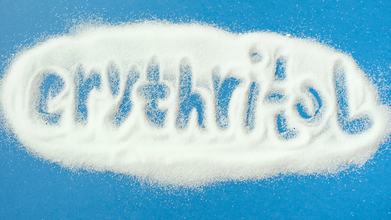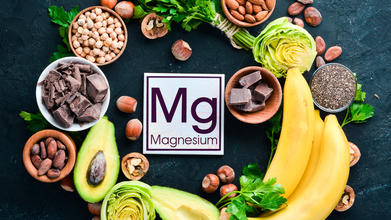- Health Conditions A-Z
- Health & Wellness
- Nutrition
- Fitness
- Health News
- Ayurveda
- Videos
- Medicine A-Z
- Parenting
Selenium, Zinc And Iodine: How These Nutrients Balance Your Thyroid Naturally?

Health and me
Hidden at the bottom of your neck, the thyroid gland is a tiny thing, but it has a gigantic responsibility to handle. Acting as the body's master regulator of metabolism, energy, pulse rate, temperature, and even fertility, the butterfly-shaped endocrine gland is an absolute necessity to your well-being. So serious is its role that when the thyroid is out of balance, almost every cell and system in the body suffers.
Though it is very important, thyroid wellness remains largely misconceived and underrated. Millions of people all over the world quietly endure symptoms of thyroid malfunction — fatigue, weight fluctuation without reason, mood instability, hair loss, infertility — unaware that a micronutrient imbalance might be at the root. While drugs and thyroid hormone substitutes usually take center stage, the key to thyroid wellness is something much easier and more potent: diet.
Your thyroid isn't a gland — it's an inner compass for your body. It regulates energy, mood, metabolism, fertility, and we tend to overlook the very micronutrients that keep it running, according to dietitian Lavleen Kaur. Three underappreciated heroes — iodine, selenium, and zinc — are the foundation of this nutritional system. These micronutrients, commonly ingested in trace amounts, play quietly in the background dictating the hormone production, conversion, and immune resistance that your thyroid needs to work best.
Iodine: The Hormone Maker
No topic of thyroid health can be started without iodine. This trace mineral is the chief component of thyroid hormones — triiodothyronine (T3) and thyroxine (T4). Without sufficient iodine, the thyroid is unable to make these vital hormones and the balances and functions in the body become imbalanced and dysregulated, resulting in goiter and hypothyroidism.
"Iodine is not negotiable," according to Lavleen Kaur. "It powers the thyroid's very function. But nowadays, in the name of 'healthy eating,' many substitute iodized salt with pink or rock salt, not knowing that these so-called healthy options are iodine-free."
In the quest to remain 'clean' or 'natural,' most do so unwittingly, robbing the body of one of the most important nutrients. The solution is not about demonizing rock salt or romanticizing iodized salt — it's all about balance and vigilance. "Use rock salt in your daily sabzis or dals, but put iodised salt in chutneys or pickles," she suggests.
And salt isn't the only choice. "Curd, nuts, seeds, sprouts, and greens are also nature's iodine gifts," she adds. In functional medicine, the value of iodine goes beyond thyroid function to include metabolic well-being, hormonal balance, and regulation of growth, so making it necessary not only for thyroid function but for systemic vitality.
Selenium: The Thyroid's Shield
If iodine constructs thyroid hormones, selenium guards them — and the gland — from damage. Selenium is a potent antioxidant that helps convert T4 (inactive) to T3 (active), the hormonal form your body utilizes. It also protects the thyroid against oxidative stress and inflammation.
Selenium is the thyroid's shield," states Kaur. "You don't require pills. A handful of Brazil nuts per week, or Indian staples such as lentils and sunflower seeds, will suffice."
At a functional level, selenium is integrated into selenoproteins, which are crucial for hormone metabolism and immune protection. The proteins prevent autoimmune thyroid disease like Hashimoto's thyroiditis by dampening chronic inflammation in the gland.
In selenium-deficient people, research has demonstrated increased rates of thyroid disease aggravation. Luckily, foods high in selenium are easily available, and it is possible to strengthen thyroid resistance through daily fare — no script needed.
Zinc: The Quiet Multi-tasks
Too often in the shadow of sexier nutrients, zinc plays the quiet multitasker in the thyroid story. It helps in the synthesis and conversion of thyroid hormones, regulates enzyme function, and aids immune function — a triad of activity crucial to thyroid equilibrium.
"Zinc is in the background, but it's essential," stresses Kaur. "Eat pumpkin seeds, legumes, and whole grains, and observe the change in energy and equilibrium."
Zinc also impacts the thyroid's capacity to uptake iodine, earning it the title of synergistic nutrient in thyroid physiology. Beyond the thyroid, zinc's significance in functional medicine spills over into issues with gut health, mood, and reproductive health. Not only can a lack of zinc undermine immune function, it can also compromise the body's capacity to convert T4 to T3 efficiently — causing subtle hypothyroidism symptoms such as brain fog, fatigue, and cold intolerance.
Why Your Thyroid Requires Balance?
The prevailing narrative of thyroid health tends to center on repairing what's damaged but what if the discussion changed to supporting what's already smart and regulating?
As Kaur explains, "We don't need to 'fix' the thyroid. We need to nourish it. Respect it." Connecting food to purpose and routine to intention turns thyroid care into a sustainable lifestyle instead of a reactive treatment.
Rather than running to supplements at the first hint of trouble, use real, whole foods as your initial defense — iodised salt, yogurt, Brazil nuts, legumes, seeds, and leafy greens. These functional foods are silently potent, particularly when eaten regularly and with awareness.
Should You Consume Supplements?
Although good-quality supplements may help those who have dietary limitations, absorption problems, or particular deficiencies, they must never act as substitutes for food as your source of nutrients. Before adding any supplement to your regimen — particularly iodine, selenium, or zinc — speak with your healthcare professional. Nutrient interactions, medical conditions, and dosing tolerances can differ greatly among individuals.
Thyroid wellness isn't about excess. It's about the little, everyday routines that root your body's hormonal harmony. With a sprinkle of iodized salt or a handful of Brazil nuts, every food decision has the power to rebalance your thyroid — and with it, your energy.
As Lavleen Kaur puts it, "True wellness is not loud. It's rooted. Balanced. And often begins with something as small as a pinch of the right salt."
Lavleen Kaur is a certified Dietitian and Founder of Santushti Holistic Health & Diet Insight Nutrition Academy in India
Erythritol Sweetener Could Be Linked To Stroke Risk, Finds Study

Credits: Canva
Erythritol sweetener, commonly found in most of the food we consume, whether it is a protein bar or energy drink could be linked to stroke risk. While it is considered as a safer alternative to sugar as a natural sweetener, a study from the University of Colorado suggests it could damage cells in the blood-brain barrier.
The blood-brain barrier is brain's security system that keeps the harmful substance off the limits, while letting in nutrients. Research also suggests that it would lead to serious consequences for heart health and stroke risk.
Erythritol Sweetener Risk: What Did The Study Find?
In the latest study, researchers exposed cells that form the blood–brain barrier to erythritol levels typically seen after consuming a soft drink sweetened with the compound. What followed was a cascade of cellular damage that could leave the brain more vulnerable to blood clots, one of the leading causes of stroke.
The researchers found that erythritol triggered intense oxidative stress, overwhelming cells with unstable molecules known as free radicals. At the same time, it weakened the body’s natural antioxidant defences. This double hit impaired normal cell function and, in some cases, led to cell death.
Damage to blood–brain barrier cells is particularly concerning because this barrier plays a crucial role in protecting the brain from harmful substances circulating in the bloodstream. When its integrity is compromised, the risk of neurological injury rises sharply.
Erythritol Sweetener Risk: How It Disrupts Blood Flow Control
Even more troubling was erythritol’s effect on how blood vessels regulate blood flow. Healthy blood vessels constantly adjust their width—expanding when organs need more oxygen and nutrients, and narrowing when demand is lower.
This process depends on a delicate balance between two molecules: nitric oxide, which relaxes blood vessels, and endothelin-1, which causes them to constrict. The study found that erythritol disrupted this balance by reducing nitric oxide production while increasing endothelin-1 levels.
The result is blood vessels that stay constricted longer than they should, potentially restricting blood flow to the brain. This kind of dysfunction is a known warning sign for ischaemic stroke, the most common form of stroke caused by blocked blood vessels.
Erythritol Sweetener Risk: How It Interferes With Body's Clot Defense
The most alarming finding in the study was how body's natural protect against blood clot is disturbed. Under normal circumstances, cells release a substance called tissue plasminogen activator, which is described as a natural 'clot buster', which helps dissolve clots before they become dangerous. However, erythritol could interfere with this protective mechanism and allow clots to persist and cause damage.
Several have shown that people with higher blood levels of erythritol face significantly increased risks of cardiovascular events. In one major study, individuals with the highest erythritol levels were nearly twice as likely to suffer a heart attack or stroke.
However, researchers caution that the experiments were conducted on isolated cells rather than full blood vessels. More advanced models that better replicate human physiology will be needed to confirm the findings.
Erythritol occupies a unique space in the sweetener world. Classified as a sugar alcohol rather than an artificial sweetener, it escaped recent World Health Organization guidance discouraging artificial sweeteners for weight control. Its sugar-like taste has also made it a favorite in “keto-friendly” and sugar-free foods.
5 Ultra Processed Foods That Could Be Worse Than You Think, Explains Expert

Credits: Canva
Ultra-processed foods (UPFs) have been dominating nutrition debates in recent months, but experts say not all UPFs deserve equal concern. Some may be far more disruptive to metabolic and heart health than others, depending on ingredients and frequency of consumption.
UPFs are industrially manufactured products that typically contain refined flours, industrial seed oils, added sugars, preservatives, emulsifiers and stabilizers. Several studies have linked high UPF consumption to obesity, metabolic disorders and cardiovascular disease. One recent study even suggested that eliminating UPFs could significantly accelerate weight loss, while others have connected them to a higher risk of chronic illness.
Speaking to Fox News Digital, Eric Berg, a Florida chiropractor and health educator known online as "the Knowledge Doc," highlighted five commonly consumed ultra-processed foods that may warrant extra caution.
Ketchup: Small Amounts, Hidden Sugars
Ketchup may seem harmless, but many commercial varieties contain significant amounts of added sugar, often in the form of corn syrup. Even when consumed in small quantities, frequent use can steadily increase daily sugar intake.
Over time, this added sugar may contribute to excess calories and disrupt metabolic health. Checking ingredient labels and opting for low-sugar or sugar-free alternatives can help reduce this hidden source of sweetness.
Flavored Yogurt: A Health Halo Problem
Yogurt is widely perceived as a health food, but flavored versions can be misleading. Many contain added sugars, artificial sweeteners and stabilizers that outweigh their nutritional benefits.
While yogurt itself can support gut health—especially when fermented with beneficial bacteria—experts stress that the health impact depends heavily on sugar content, ingredients and portion size. Choosing plain yogurt and adding fresh fruit or natural sweeteners at home is often a better option.
Soda Crackers: Refined and Deceptive
Soda crackers are often marketed as a light or “safe” snack, yet they frequently contain refined flours, added sugars and unhealthy oils. These refined ingredients are quickly digested, which may trigger blood sugar spikes, particularly when eaten without fiber or protein.
Healthier alternatives include whole-food-based crackers made from nuts or seeds, which offer more fibre, nutrients and longer-lasting satiety.
Candy Bars: More Than Just Sugar
Candy bars are one of the most obvious examples of ultra-processed foods. They are typically made with refined starches, seed oils and artificial additives while offering little to no nutritional value.
Frequent consumption of such products has been linked by nutrition experts to poorer metabolic health over time. The concern isn’t just sugar, but the combination of unhealthy fats, refined carbohydrates and additives that may collectively strain cardiovascular and metabolic systems.
Ice Cream Cones: The Overlooked Culprit
Interestingly, it’s not the ice cream itself but the factory-made cone that raises red flags. These cones are often ultra-processed, containing refined flours, added sugars, unhealthy oils and artificial ingredients.
When paired with commercial ice cream, the result can be a “double hit” of sugar, unhealthy fats and additives, significantly lowering the overall nutritional quality of the treat.
The Bigger Picture
Experts emphasize that moderation matters, and occasional indulgence isn’t the issue. The real concern lies in habitual consumption of ultra-processed foods that quietly dominate daily diets. Reading labels, prioritising whole foods and being mindful of ingredient lists can go a long way in protecting long-term health.
After 50, Your Body Steals Magnesium From Bones, Says Neuroscientist

Credits: Canva
Magnesium has become one of the most talked-about nutrients in the supplement space, especially among people looking to improve sleep, reduce stress, and support brain health. While experts consistently stress that magnesium-rich foods should be the first line of defense, supplements are often recommended when dietary intake falls short, provided they are taken after consulting a doctor.
Magnesium plays a critical role in brain function and overall health. It is involved in more than 300 enzymatic processes in the body, influencing everything from nerve signalling and muscle function to bone strength and sleep regulation. But not all magnesium supplements are the same, and choosing the wrong form could mean wasting money or dealing with unwanted side effects.
In an Instagram video published on February 2, neuroscientist Robert WB Love, who focuses on brain health and Alzheimer’s disease prevention, explained the differences between commonly available forms of magnesium. He also stressed why women above 50, in particular, should take magnesium intake seriously.
Why magnesium matters, especially for women over 50
According to Love, magnesium is essential for maintaining a healthy brain and body. He warned that when the body does not get enough magnesium through food or supplements, it compensates by pulling magnesium from the bones.
“Women over 50, listen up,” he said in the video. “If you don’t eat enough magnesium-rich foods or take a magnesium supplement to get the right amount, your body will literally steal magnesium from your bones to use in vital processes throughout the body.”
This, he explained, is why consistent magnesium intake is not just important for brain health but also for protecting bone strength as women age. Ensuring adequate magnesium through diet and supplementation can help support both cognitive function and skeletal health.
Magnesium citrate: Common but not ideal
Magnesium citrate is one of the most widely available forms, largely because it is inexpensive. However, Love described it as a low-quality option for brain health.
“It’s hard to absorb and can upset your stomach,” he explained, adding that many people experience digestive discomfort after taking it. Because of its poor absorption, magnesium citrate may not deliver meaningful benefits to the brain, making it a less effective choice overall.
Magnesium glycinate: Gentle and effective
Magnesium glycinate, according to the neuroscientist, is one of the better options available. It is well absorbed, gentle on the stomach, and beneficial for the brain and the rest of the body.
He also highlighted its positive impact on sleep and stress levels. Many people report sleeping better when they take magnesium glycinate before bedtime, making it a popular choice for those struggling with restlessness or anxiety.
Magnesium threonate: Best for the brain
Magnesium threonate stands out because of its ability to cross the blood-brain barrier. Love explained that this allows it to directly enter the brain, making it the most potent form for cognitive health.
However, it is more expensive and harder to find than other forms. Despite this, he noted that both magnesium threonate and magnesium glycinate are excellent options for brain support.
Magnesium taurate: The underrated option
Love also pointed to magnesium taurate, a form that does not get much attention. According to him, it is particularly beneficial for heart health.
“What’s good for your heart is good for your brain,” he emphasised, suggesting that magnesium taurate may offer indirect brain benefits by supporting cardiovascular function.
© 2024 Bennett, Coleman & Company Limited

